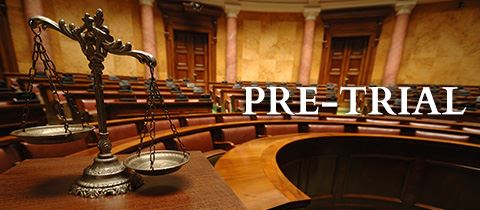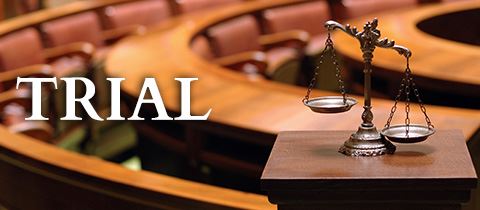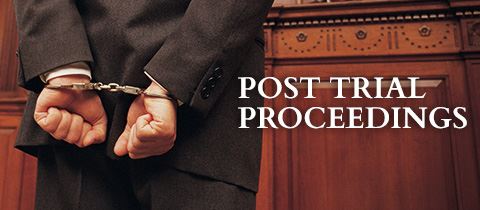The criminal process is no simple matter. No matter what popular law dramas on television, it is not limited to just the arrest, hearing, and sentencing. Criminal defense lawyers often forewarn their clients of a protracted trial ahead, especially for first-time defendants who have no knowledge of how the justice system works. Trial proceedings tend to drag on due to a number of legal factors coming from either parties on trial or the court itself.
The same concept applies to the criminal trial process in Nevada. The length of the proceedings depends mostly on the severity of the crime that the defendant is accused with. Whatever case it might be, it will always follow the general process of an exhaustive pre-trial, the trial itself, and post-trial proceedings which may or may not include post-trial motions and appeals on the part of the defendant.
The Pre-Trial

The defendant’s rights
The court aims to balance between providing for the rights of the victim and the rights of the accused in any criminal trial. A trial cannot be considered fair if the defendant’s rights are not protected. These rights are covered in the general statute of the Right to Due Process of Law.
- Writ of Habeas Corpus: The defendant has the right to be freed from detention if the prosecution cannot provide definite proof of his or her crime within a prescribed period by law.
- Search Warrants: The defendant’s properties are protected from search and seizure by authorities unless a proper warrant is presented.
- Trial by Jury: The defendant’s guilt can only be determined by other citizens like him, and not by overzealous officers of the law or prosecutors.
- Self-Incrimination: The defendant has a right to avoid testifying against himself, but he must provide valid reason that his testimony may lead to a false conviction.
- Double Jeopardy: The defendant has a right against being convicted for a crime if he has already served time for that crime in a previous conviction; this right does not apply to an appealed case, or to a case in a civil court, however.
- Excessive or Cruel Fines and Punishments: The defendant is protected by law from excessive fines, and punishments that are considered overly inhumane or excessively harmful; sometimes this right extends to protection against incarceration in improper or unsanitary detention facilities.
Posting bail
Except for the most severe of felonies, a defendant will have to go through a bail hearing as part of the pre-trial process. The amount of bail that can be posted by the defendant depends on the severity of his accused crime, and the number of times he has allegedly committed said crime. Nevada’s revised statutes have special mention for refusing to grant bail to people who committed any crimes while intoxicated unless they can maintain their blood alcohol levels in check, however.
Arraignments and pleas
During arraignment, the court informs the defendant, in detail, of the crimes he is accused with, along with other circumstances related to his case. The defendant must then provide the court with a plea in response, which may either be ‘guilty’, ‘not guilty’, or a plea of ‘no contest’, which carries the same weight as a guilty plea but is often used in the events of a plea bargain. After the defendant has been arraigned, he or she has a right to a trial within 60 days of his arraignment hearing, although this right can be waived.
Plea bargaining
Defendants who choose to plead guilty or enter a plea of no contest in the court records are granted the chance to commit to a plea bargain. The defense often negotiates for the court to hand out a reduced sentence, which may or may not reduce any adverse effects the conviction can have on the defendant. Plea bargains are also offered by the court if they want the defendant’s cooperation and testimony in convicting his or her co-defendants in the same case.
The Trial

The period for the trial proceeding covers the time of the selection of the jury to the announcement of the jury’s verdict of the case. Any actions taken after this period are considered part of post-trial motions and may or may not have any bearing on the conviction, or the proceedings themselves.
- Jury Selection: Both the prosecution and defense counsels are called to select 12 jurors at random from a roster provided by the court. Discriminating against any potential juror is prohibited, while jurors or potential jurors can be dismissed if they cannot perform their full capacity as jurors.
- Opening statements: The prosecution and the defense will provide their own accounts of the crime, mostly providing an outline of the events.
- Presentment of cases: The prosecution conducts a direct examination of their witnesses, with the defense conducting a cross examination after each one; after the prosecution completes its examination, the defense can provide their own witness for direct and cross-examination. Objections can be raised during questioning, for example if the line of questioning has diverted from the case.
- Closing statements: Both parties provide their closing statements as a final way to convince the jury to hand out a verdict in their favor.
- Jury instructions, deliberations, and final verdict: The court charges the jury with the appropriate laws related to the case. They will then deliberate the testimonies and evidence before openly notifying all parties concerned of their verdict on an appointed day in court.
Post-Trial Proceedings

Any event that happens after a verdict has been handed down is considered a part of post-trial proceedings. These proceedings involve the defendant’s sentence hearing and the possible filing of a motion to appeal the case.
Sentencing
Judges do not hand out a sentence immediately after receiving the verdict from the jury. Prior to the sentencing itself, the judge reviews information provided by other parties related to the case, chief of which is the presentencing investigation report provided by specialized Parole and Probation employees. These reports include interviews of both the convicted defendants and the victims in the case, to determine what impact the crime has had on both parties; this analysis will help the court determine the appropriate punishment for the defendant. Once the merit of all statements, reports, and presented evidence have been weighed, the defendant will appear in court to hear his or her sentence.
Post-trial motions and appeals
Defendants who are not satisfied with the verdict of their trial have the right to appeal their case. By successfully filing a motion to appeal, the defendant can have a higher court review the evidence and statements presented in the case, with the possibility that the lower court’s verdict may be overturned in favor of the appellant. Take note than an appealed case does not become a retrial; it only allows the higher court to review the concluded trial and find a flaw that would throw the original verdict out.
In addition, either party involved in the case can file any of a set of post-trial motions which can affect the verdict of the trial. These motions include:
- Motion to Amend the Court’s Findings: the filing party found inconsistencies with the court’s findings and ask for a review.
- Motion for a New Trial: The filing party requests a retrial while claiming that the previous trial lacked merit.
- Motion to Amend the Court’s Judgement: The filing party found the sentence to be too lenient or too cruel.
- Motion to Amend a Clerical Mistake in the Judgement: The filing party found a clerical error in the sentence that can have a negative or positive effect on the case results.
- Motion to Set Aside the Judgement: The filing party requests the court to dismiss the judgement entirely.
- Motion to Stay Enforcement of the Judgement: A reverse of the previous motion.
The process of obtaining justice in a court of law can be a long and tedious fight. However, with the knowledge of how things work in a trial case, and with the help of a dedicated defense lawyer, one is sure to go through the motions and eventually prove their innocence.

